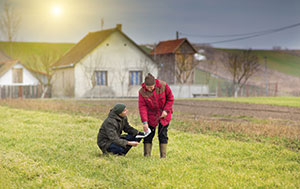First Steps to Farm Diversification (where to start)
Have you decided that Farm Diversification is the next step for your business, or maybe you are weighing up your options?
Diversifying can be a big step, even for the most experienced farmer and changing your usual working day to include a whole new business that could be completely different from you current working breadwinner, is a scary step to take. That is why we asked Paris Smith Law Firm to put together this great first step guide to help you start on your journey... whether it be a beer distillery or a wind farm, we want you to be prepared.
How should farmers go about diversifying their farms?
As ever, research is vital as to what is going to work. Check out what is required in the area and who is going to use it. It's no good converting redundant farm buildings into offices if the area is awash with empty units which aren't letting, or setting up an equestrian centre if the area is not not going to attract horse lovers. Take as much advice as possible from those who have already diversified- they will have gone through many of the hurdles in the way of achieving success and most farmers are more than happy to share their experiences.
 The legal implications of diversification
The legal implications of diversification
Any change of use away from straight agriculture may require planning consent. This can be costly and take several months or longer to obtain. However, changes to the Permitted Development Rights regime (under the General Permitted Development Order) have been extended to include agricultural buildings in some cases. These changes include Class Q which permits a change of use of agricultural buildings and any land within its curtilage to a number of flexible commercial uses. both these changes of use require the prior approval of the local planning authority and there are a number of exclusions and restrictions within the legislation. This is where the expert knowledge of a planning consultant is invaluable to guide you through the process.
If letting property to a third party, you should avoid granting security of tenure to a tenant as this may severely limit how you can use the farm in the future and could also adversely affect its value should you wish to sell.
Consideration must also be given to issues such as VAT, business rates and whether the new enterprise should be set up and run by a distinct legal entity totally separate from the existing farmer/owner.
The potential impact on Inheritance Tax and Capital Gains Tax should not be overlooked.
If the new enterprise requires staff, then complicate employment regulations must be adhered to.
If opening to the public, there will be a myriad of health and safety issues to comply with.
What should be the first steps in planning?
You should always consider the merits of seeking effective planning consultancy and planning legal advice from the very outset of your discussions around new project ideas. an early stage planning appraisal report from a planning consultant is usually a very sensible and cost-effective change of use before the future planning risks and opportunities of proposed development or change of use before you commit significant tranches of money on the associated planning application, architect and other technical consultants' fees.
What things should farmers watch out for e.g., pitfalls?
An early-stage planning appraisal report from a planning consultancy with legal expertise can help you identify aspects of development that might be able to be achieved using permitted development rights (thus potentially avoiding the costs and risks of needing the pursue a planning application); as well as devising insightful strategies for any future planning applications that are still required. This can help to thoroughly assess if your initial ideas are likely to comply with local and national planning policies; and whether or not there are likely to be any significant material planning problems raised during a planning application. These are all pitfalls that can have serious consequences to the outcome of your planning application - and therefore serious risks to the costs you have invested in the process.
Written by Janet May, Peter Kershaw, Jane Rarok, Guy Hurst at Paris Smith: parissmith.co.uk
- Log in to post comments

